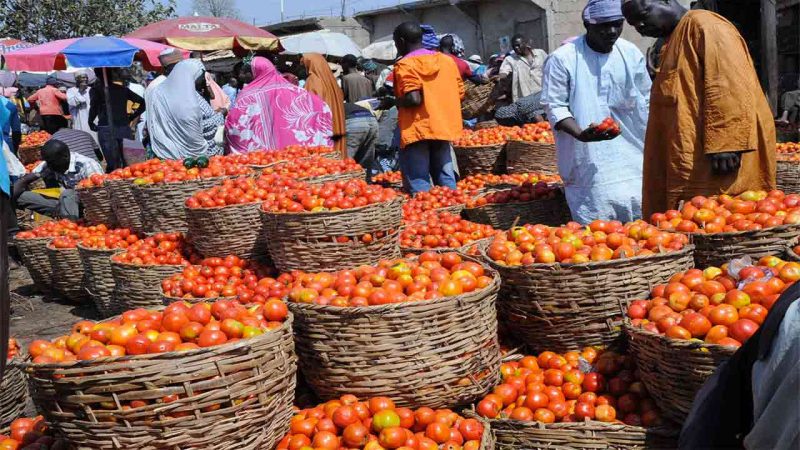Nigeria’s consumer price index (CPI), which is used to measure the level of inflation in the country has risen by 170.2% under President Muhammadu Buhari’s administration, between June 2015 and July 2022.
This is according to data tracked and analysed by Nairalytics – the Research arm of SKYTREND NEWS. Recall that the president was sworn into office as the 15th President of the federation on Friday, 29 May 2015, following the presidential general election held, a position which he has occupied since then.
During the period, Nigeria’s consumer price index rose from 171.6 index points recorded in May 2015 to 463.6 points in July 2022, indicating an increase of 170.2%. In the same period, the food index rose by 209.5%, while core inflation spiked by 132.2% in the same vein.
The year-on-year inflation rate accelerated to a 17-year high in July 2022, following significant rise in the cost of energy, and staple food items. The National Bureau of Statistics (NBS) reported that Nigeria’s inflation rate rose to 19.64% in July 2022 from 18.6% recorded in the previous month.
Nigerians now have to grapple with the high cost of virtually everything, as the underlying issues persist across board. First, let us look at the disaggregated indices.
The health index, which tracks the cost of health services in the country has surged by 122.3% between May 2015 and July 2022, while on a year-on-year basis, the health inflation rate stood at 15.95% in July from 15.6% recorded in the previous month.
Also, clothing and footwear index spiked by 146.3% in the review period, with the year-on-year rate at 17.73%.
Nigeria’s Inflation Rate Ballooned By 170% Under President Buhari
Similarly, the transportation index jumped by 141.7% in the seven-year period, education recorded a 132.5% increase, restaurants and hotels (132.5%).
It is worth adding that, despite significant intervention to reduce Nigeria’s dependence on food importation, we are largely exposed to the global food crisis. Notably, the imported food index rose by 201.5%, a major contributor to the rise in the food index.
In the same vein, house water, electricity, gas, and other fuel recorded a 119.7% increase in its index between May 2015 and July 2022.
Genesis of Nigeria’s inflationary woes
Though the Nigerian economy is characterised by various structural and socio-economic issues, which have seen the country maintain a double-digit inflation rate since February 2016. Surprisingly, Nigeria enjoyed a single-digit inflationary rate regime between January 2013 and January 2016.
However, a combination of ineffective policies, global economic headwinds, socio-economic vices, have seen Nigerians purchasing power eroded at a very fast pace. With a 20% inflation rate in sight, last of which was recorded in September 2005 (17 years ago).
- We take a look at some of the factors and policies that have bedevilled Nigerians’ purchasing power.
Over-reliance on oil revenue – 2016 oil crash
- In 2016, Nigeria’s economy dipped significantly characterised by five consecutive quarters of GDP contractions from Q1 2016 through to Q1 2017.
- The decline which was attributed to a significant crash in the price of crude oil and Nigeria being overly reliant on crude oil as a source of revenue suffered deeply, with the federal government recording a fiscal deficit of N2.14 trillion and N4.35 trillion the following year.
- The economic nosedive during the period also caused a significant hike in price of goods and services as the headline inflation rate rose from 9.62% in January 2016 to a peak of 18.72% in January 2017 before moderating. This is after the Central Bank had raised interest rates twice to curb the racing inflationary pressure.
Land border closure – 2019
- Following the downturn caused by the crude oil market volatility from 2016 through to 2017, the Nigerian president in a bid to diversify the economy and encourage local production and consumption of agricultural produce ordered the closure of all land borders in the country.
- Specifically, on the 19th of October 2019, the Comptroller-General of the Nigerian Customs Service, retired Col. Hameed Ali at the order of the president, announced complete closure of the Nigerian land border, noting that all import and export of goods from the country’s land border were banned until there is an agreement with neighbouring countries on the kind of goods that should enter and exit Nigeria.
- This is following an initial announcement by the CBN in 2015 to ban a list of 41 imported goods and services from accessing the official Nigerian Foreign Exchange Market. This means that international traders, particularly importers would have to source forex on their own to meet import bill obligations.
- Fast forward to 2019, the prices of most food items surged significantly, items such as rice and bread, which are major everyday foods for Nigerians witnessed unprecedented levels of price increases during this period.
- Consequently, Nigeria’s inflation rate hit 11.61% in October 2019, and continued upward, further exacerbated by the covid-19 pandemic in 2020.

